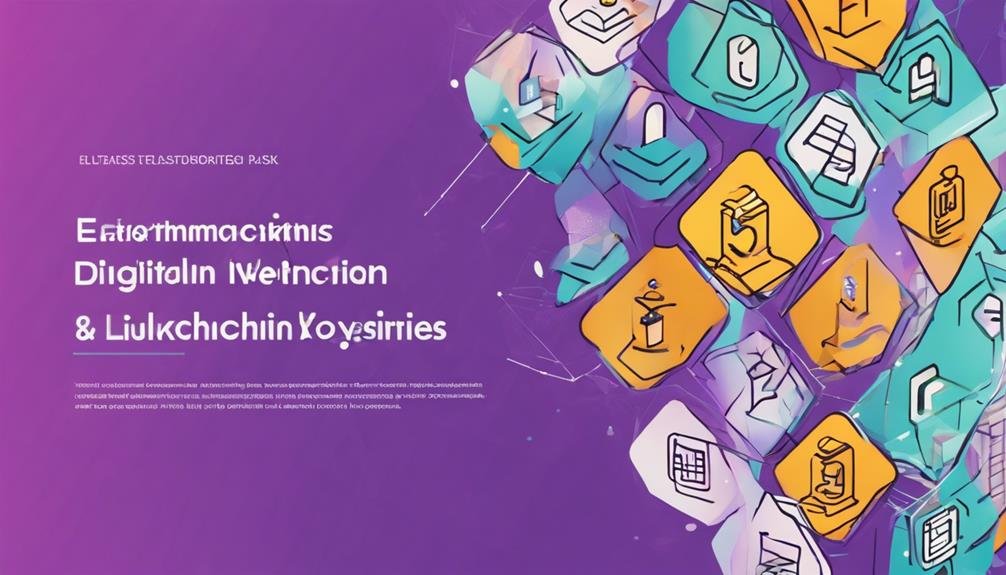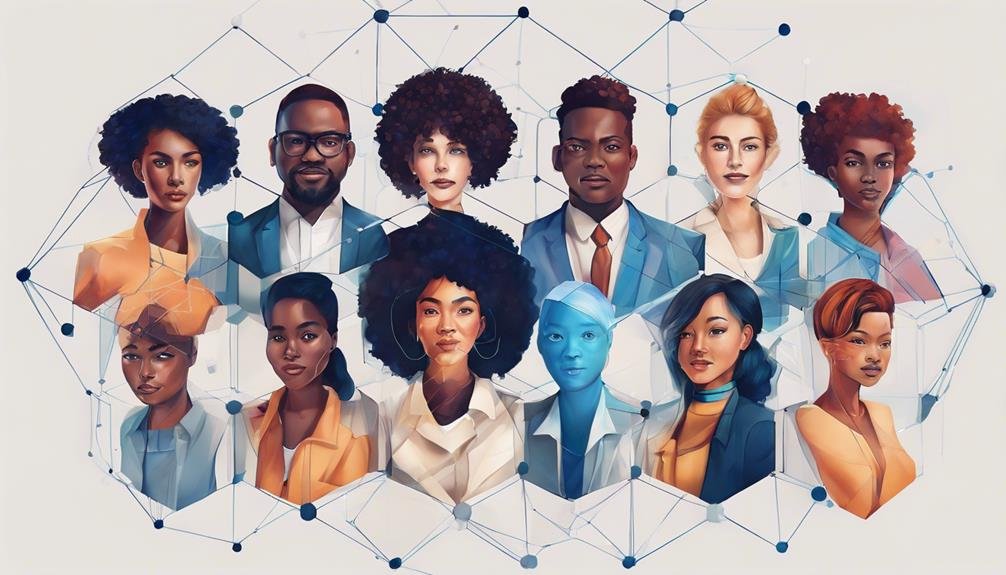Blockchain projects are transforming social equality by empowering marginalized groups. Through innovative initiatives like NFTs for financial inclusion, transparent identity management, and supply chain integrity, blockchain bridges gaps. Decentralized aid distribution platforms guarantee fair assistance. Such projects offer transparency, security, and financial opportunities to underrepresented communities. Smart contracts within blockchain platforms safeguard rights and enable participation in the global economy. Explore how these advancements are reshaping societal norms for the better.
Brief Overview of NFT Projects Promoting Social Equality
- Blockchain projects enable marginalized communities to access financial services.
- Decentralized platforms offer transparency and empowerment to underserved groups.
- Smart contracts ensure fair treatment and rights protection for all participants.
- Bridging the digital gap allows marginalized populations to engage in the global economy.
- Empowering through secure financial transactions enhances financial opportunities for all.
NFTs for Financial Inclusion
NFTs are transforming financial inclusion by providing ownership opportunities to marginalized communities and empowering them with access to the crypto economy. Through NFTs, individuals previously excluded from traditional financial systems can now participate in a digital sphere that was once out of reach. These ownership opportunities provide a gateway for those in developing economies to explore new avenues for economic growth and financial stability. By owning NFTs, individuals can tap into a world where their assets are securely stored on the blockchain, ensuring transparency and ownership rights that were previously unattainable.
The ability to own NFTs grants financial empowerment and opens doors to new economic opportunities. Rewards linked to NFTs can incentivize individuals to engage more actively in financial activities, ultimately promoting financial literacy and inclusion. This newfound engagement with the crypto economy allows marginalized communities to bridge the gap between traditional financial systems and the digital space, paving the way for income generation and economic advancement.
Identity Management Solutions on Blockchain

Secure and self-sovereign identity management solutions on the blockchain revolutionize how refugees and marginalized communities control their data and access essential services. By leveraging blockchain technology, individuals can manage their identities securely, reducing the risk of identity theft and enhancing access to crucial services. Here are some key points to keep in mind:
- Blockchain technology enables self-sovereign identity, giving individuals full control over their personal information.
- These systems empower refugees to establish their identities, facilitating access to resources and opportunities.
- Digital identities on blockchain enhance security measures, minimizing fraud and ensuring a streamlined process for refugees to receive aid.
- Initiatives like Cardano’s collaboration with the Ethiopian government demonstrate the practical application of blockchain in providing digital identification solutions for refugees.
Supply Chain Transparency Initiatives

Empowering refugees and marginalized communities through secure and self-sovereign identity management on blockchain opens the door to enhancing transparency in supply chains through initiatives that promote accountability and integrity. Blockchain technology is pivotal in ensuring transparency within supply chains by securely recording transactions and data, maintaining integrity, and enabling traceability. Smart contracts further bolster supply chain transparency by automating processes, thereby reducing the risks associated with fraud and errors.
Real-time tracking of goods and services facilitated by blockchain enhances efficiency in supply chain management, benefiting from increased accountability and streamlined operations. Blockchain technology’s transparency fosters trust among stakeholders and consumers and encourages ethical practices and sustainability within the supply chain ecosystem. Through these initiatives, blockchain continues to revolutionize traditional supply chain methods, paving the way for a more transparent and trustworthy system.
Decentralized Aid Distribution Platforms

Leveraging blockchain technology, decentralized aid distribution platforms revolutionize resource allocation by ensuring transparency and efficiency. These blockchain-based platforms facilitate direct peer-to-peer financial transactions, cutting out intermediaries and lowering costs considerably. They offer real-time fund tracking, enhancing trust and transparency in the aid distribution.
Smart contracts in these systems automate distribution, ensuring timely and targeted assistance to those in need. Organizations can efficiently reach beneficiaries directly by utilizing decentralized aid distribution platforms, fostering inclusivity and empowerment within communities. The secure and immutable nature of blockchain technology not only streamlines the distribution of aid but also safeguards the integrity of transactions, instilling confidence in donors and recipients alike.
Empowering Marginalized Communities

Utilizing blockchain technology allows marginalized communities access financial services and opportunities previously out of reach. These communities are provided with transparency and empowerment through decentralized blockchain projects, enabling them to participate in the global economy. Smart contracts within blockchain platforms guarantee fair treatment and protection of rights for marginalized individuals, fostering a sense of inclusion and equality. By leveraging blockchain-based solutions, the digital gap that often isolates marginalized populations is bridged, allowing them to have a voice in decision-making processes.
Empowerment lies at the core of these initiatives, as blockchain technology offers a pathway for marginalized communities to break free from traditional financial constraints. By embracing blockchain capabilities, individuals who were once excluded from mainstream financial services can now engage in transactions securely and efficiently. This newfound accessibility enhances financial opportunities and contributes to the empowerment of marginalized groups, offering a promising avenue for social equality.
Frequently Asked Questions
How Can Blockchain Be Used to Impact Society?
Blockchain enables decentralized governance through transparent voting systems, fostering democracy. It promotes financial inclusion by providing secure identity solutions. Transparent supply chains secure fair trade, benefiting society through increased access and reduced fraud. Blockchain truly impacts society positively.
What Is the Blockchain for Social Good Issue?
Decentralized solutions promote transparent transactions and financial inclusion in blockchain for social good. Initiatives leveraging blockchain technology for social equality aim to empower marginalized communities, ensure accountability, and enable fair trade practices.
What Is the Impact of Blockchain in Social Networks?
In social networks, blockchain boosts transparency, enables decentralized governance, and empowers users. You control your data, fostering trust and security. Embrace the impact of blockchain for increased transparency, decentralized governance, and user empowerment in social networks.
How Can Blockchain Help People?
You can benefit from blockchain by achieving financial inclusion through transparent supply chains, secure identity verification, and streamlined aid distribution. Blockchain empowers individuals by providing access to opportunities and resources for economic growth and social mobility.
Conclusion
To summarize, the innovative blockchain projects discussed have the potential to revolutionize social equality, but let’s not forget the irony – technology designed to empower can sometimes exclude those who need it most. While these initiatives offer promising solutions, it’s essential to guarantee that they truly benefit marginalized communities and don’t inadvertently widen existing inequalities. As we navigate this complex landscape, let’s aim for inclusivity and genuine impact in pursuing empowerment through blockchain innovation.










